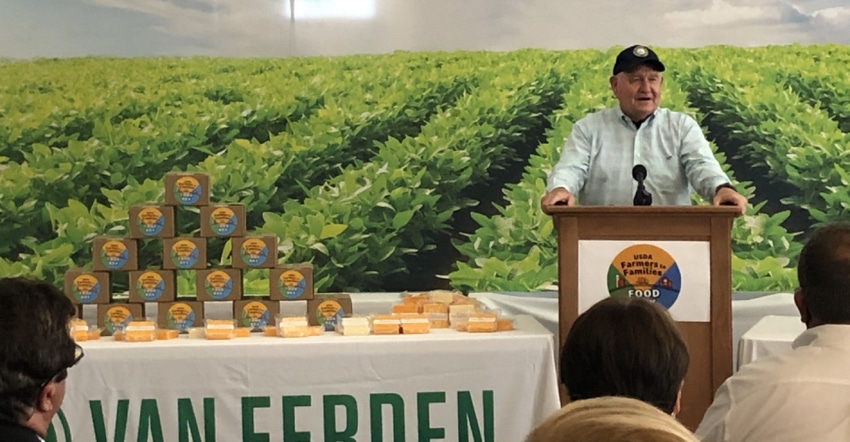Perdue says more COVID-19 aid needed for farmers
Senate introduces bill to boost funds for hog producers forced to euthanize animals.

As COVID-19-related losses mount in the U.S. farm economy, U.S. Agriculture Secretary Sonny Perdue predicts that the $16 billion in direct payments to producers through the Coronavirus Food Assistance Program (CFAP) won’t be enough.
“We're looking at that right now, and our economists are working on those numbers, but we do believe that we were not able to sufficiently cover the indemnification from COVID-19 in the first tranche of the $16 billion program,” Perdue said during a one-day tour through Michigan on June 30.
Since CFAP enrollment opened on May 26, Perdue estimates that USDA has already disbursed nearly $5 billion in direct CFAP payments to producers to compensate for market losses and disruptions. With two months remaining before the Aug. 28 deadline, more applications are expected. (Click here for the most recent report as of June 29, 2020.)
Of that total, more than 50%, or $2.4 billion, was paid to livestock (cattle, hog and lamb) producers, $1.3 billion (26%) was paid to non-specialty crop producers, $1 billion (22%) was paid to dairy producers and $113 million (2%) was paid to specialty crop producers, according to a breakdown in a recent American Farm Bureau Federation "Market Intel" report.
Perdue said USDA is also reviewing disaster program options for an additional $14 billion Congress appropriated to replenish the Commodity Credit Corp. that will be available in July.
“We know that COVID-19 had some immediate impacts on agriculture, but we fear that it may have a longer tail going into the fall as well,” Perdue said. “We’re looking right now at what the effective damage was so we can create a program that could potentially use the $14 billion as well. There may be need for more, but we don't know what the tale of the results of this COVID-19 will be going forward.”
Legislative days ahead
On Thursday, the Senate left for a recess until July 20. The House will hold only pro forma floor sessions the first two weeks of July, while House appropriations subcommittees and the full House Appropriations Committee will meet and prepare bills for floor votes July 20-31.
Reports indicate that Sen. Chuck Grassley (R., Iowa) said no formal negotiations between Senate and House leaders will occur on any type of additional coronavirus aid package until after the Senate returns on July 20. Grassley’s top priorities in the package include aid for biofuel and agricultural producers.
The House agriculture appropriations subcommittee is scheduled to mark up the fiscal 2021 agriculture bill on July 6, with a markup of the bill in full committee on July 9.
Hog assistance
Grassley was joined by Sens. Jim Inhofe (R., Okla.), Richard Burr (R., N.C.), Joni Ernst (R., Iowa) and Thom Tillis (R., N.C.) in introducing the Responding to Epidemic Losses & Investing in the Economic Future (RELIEF) for Producers Act of 2020.
The bill would compensate hog and poultry producers who are forced to euthanize or donate animals that can't be processed into the food supply due to COVID-19-related packing plant capacity reductions. At one point, it was estimated that 10 million hogs could be euthanized by September, although those estimates have gone down as slaughter capacity has returned to closer to normal levels.
National Pork Producers Council president Howard "A.V." Roth, a producer from Wauzeka, Wis., noted, "While plant capacity has improved, millions of hogs remain backed up on farms due to the COVID-created bottleneck -- one that could have a lasting impact on hog farmers. The RELIEF for Producers Act provides a much-needed lifeline to thousands of farmers who could otherwise go out of business, leading to consolidation and contraction of the U.S. pork industry. We urge Congress to work together to quickly pass much-needed legislation addressing this crisis."
The RELIEF for Producers Act would also increase funding for animal health surveillance and laboratories, which have appropriately assisted and shared resources with their public health partners, and revise the Commodity Credit Corp. charter so a pandemic-driven national emergency qualifies for funding.
“This legislation will help livestock and poultry farmers more easily and efficiently navigate a path forward as we battle this crisis,” Inhofe said.
About the Author(s)
You May Also Like



.png?width=300&auto=webp&quality=80&disable=upscale)

